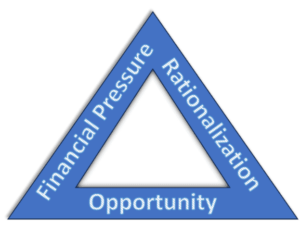Any police academy cadet can describe the elements of theft and robbery. They can delineate the requirements for probable cause and write a basic report. But what about allegations of fraud? These cases may be more complex and challenging to pin down. But are they strictly within the purview of detectives or federal investigators? I say no. The patrol officer’s role in fraud investigations is of vital importance to the outcome of the case.
The first responder to a fraud complaint can gather crucial information and set a proper investigative course at the onset. If an officer defaults to the easy option and forwards the case straightaway to the detective unit, valuable intelligence can be lost, time wasted, and a great opportunity missed. By understanding the red flags of fraud, patrol officers can quickly gather information crucial to these critical investigations.
What Is Fraud?
While robbery is theft by way of force, fraud can be described simply as theft by way of deception. Black’s Law Dictionary says fraud becomes a crime when it is a “knowing misrepresentation of the truth or concealment of a material fact to induce another to act to his or her detriment.” Unlike a simple theft that any child can perpetrate or a robbery that requires an element of force, fraud requires a higher level of sophistication.
By understanding the red flags of fraud, patrol officers can quickly gather information crucial to these critical investigations.
Everyone has heard about Charles Ponzi, who was arrested in 1920 for his “pyramid scheme” that defrauded investors of millions of dollars. More recently, terms like identity theft and phishing have become commonplace. These schemes are aimed at individuals, but organizations can be victimized as well. When employees use deception to embezzle funds, they defraud their company from within. Those same organizations can be victimized from without via check fraud, overtime scams and bid-rigging plots. The United States government is also a target for fraud, such as the deliberate misuse of millions in COVID-19 assistance money distributed without adequate internal controls.
The Fraud Diamond
Recognizing fraud is essential, but understanding the root causes will help officers as they launch their initial investigation. In the 1970s, Dr. Donald Cressey, a criminologist who served on the Organized Crime Task Force of the President’s Commission on Law Enforcement and Administration of Justice, developed the fraud triangle. Cressey postulated that “trust violators” will likely commit fraud if three elements are present: unshareable financial need, perceived opportunity and rationalization.

In 2004, David Wolfe, CPA, and Dana Hermanson, PhD, suggested the fraud triangle could be enhanced by adding a fourth element: capability. Wolfe and Hermanson noted that if the fraud triangle elements are present, but the potential fraudster cannot execute the plan, the crime will not happen.
The Patrol Officer’s Role in Fraud Investigations
Some frauds, such as those perpetrated via e-mail or telephone by overseas entities, will not typically be investigated by patrol officers. So, we will focus on a scenario where any patrol officer could be called.
An officer is dispatched to a theft at a family-owned hardware store regarding possible fraud. The owner requests to meet the officer off-site because she does not know who is involved. She explains that she discovered a false return scheme has been going on at her store. Store policy requires customers who return items without a receipt to be given a gift card with store credit. In the last year, returns have been up 45%, and she learned that her store gift cards were being sold at a local pawn shop. The hardware store owner does not know which employees are involved in the scheme, cannot afford a third-party audit, and does not have a loss prevention department.
The patrol officer’s role in fraud investigations is of vital importance to the outcome of the case.
Using the facets of the fraud diamond, the officer could ask the following questions to help identify a suspect. No single answer will identify the fraudster, but an accumulation of red flags merits further investigation.
Rationalization
- Has an employee recently been denied a raise?
- Has an employee been recently disciplined or demoted?
- Could an employee want to hurt the business for overlooking or punishing them?
- Has an employee complained they are underappreciated?
Financial Pressure
- Has an employee recently been divorced?
- Has an employee recently accumulated significant medical bills?
- Does an employee seem to be living beyond their means?
Opportunity
- Is there an employee who never takes leave and is protective of their assignment?
- Which employee processed most of the returns in the last year?
- Is there an employee who was at the store every time gift cards were issued?
Capability
- Are cashiers the only employees who can process returns?
- Which employees are authorized to distribute gift cards?
- Which employees know how to override security policies and internal controls?
This list is not exhaustive but shows how questions can be formulated based on known fraud indicators. As I stated earlier, the responding officer need not immediately forward this type of case to detectives unless that is their department’s policy. Instead, the responding officer should conduct a thorough and timely interview while witnesses are available and cooperative. If there is a delay, initially cooperative employees could become reticent to be interviewed. Likewise, an employee could resign and no longer feel compelled to assist his former employer by providing information.
No matter the interview, an officer should always ask a complainant or witness, “Who else should I talk to?” and “Who else could know about this?” I often ask witnesses, “If you were me, who would you talk to?” Questions such as these often spur further interviews and lead to new information. Responses to these theoretical questions need not be documented unless they have evidentiary value. Your reports and affidavits must contain the facts of the case, not everything you learn in an investigation. Protect sources and pursue suspects.
Whether or not the investigation gets forwarded to a detective, a patrol officer’s carefully considered questions based on well-known fraud indicators will go a long way in solving the case.
Be safe!




